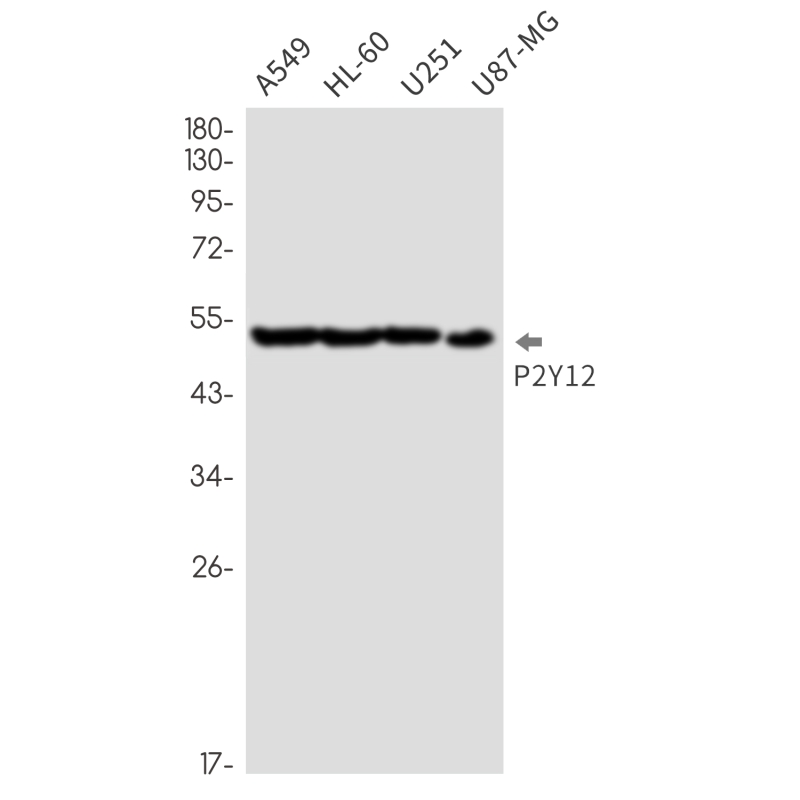
| WB | 1/500-1/1000 | Human,Mouse,Rat |
| IF | 1/20 | Human,Mouse,Rat |
| IHC | 咨询技术 | Human,Mouse,Rat |
| ICC | 技术咨询 | Human,Mouse,Rat |
| FCM | 咨询技术 | Human,Mouse,Rat |
| Elisa | 咨询技术 | Human,Mouse,Rat |
| Aliases | HORK3; P2Y12; ADPG-R; BDPLT8; SP1999; P2T(AC); P2Y(AC); P2Y(12)R; P2Y(ADP); P2Y(cyc) |
| Entrez GeneID | 64805 |
| WB Predicted band size | Calculated MW: 39 kDa; Observed MW: 52 kDa |
| Host/Isotype | Rabbit IgG |
| Antibody Type | Primary antibody |
| Storage | Store at 4°C short term. Aliquot and store at -20°C long term. Avoid freeze/thaw cycles. |
| Species Reactivity | Human |
| Immunogen | A synthetic peptide of human P2Y12 |
| Formulation | Purified antibody in TBS with 0.05% sodium azide,0.05%BSA and 50% glycerol. |
+ +
以下是关于P2Y12受体及其抑制剂(可能涉及抗体研究)的3篇代表性文献,涵盖机制、药物开发及临床研究:
---
1. **文献名称**: *Identification of the platelet ADP receptor targeted by antithrombotic drugs*
**作者**: Savi, P., et al.
**摘要**: 本研究首次确定P2Y12受体是ADP诱导血小板聚集的关键靶点,并阐明了氯吡格雷等噻吩吡啶类药物通过不可逆抑制P2Y12发挥抗血栓作用的机制,为后续药物研发奠定基础。
---
2. **文献名称**: *Monoclonal antibody-based antagonism of P2Y12 reduces platelet adhesion and thrombus formation in vivo*
**作者**: Hechler, B., et al.
**摘要**: 开发了一种靶向P2Y12的单克隆抗体,证实其可阻断ADP信号通路,显著抑制体外和动物模型中的血小板活化和血栓形成,提示抗体疗法在抗血栓治疗中的潜力。
---
3. **文献名称**: *Genetic variation in response to clopidogrel and long-term risks*
**作者**: Mega, J.L., et al.
**摘要**: 通过大规模临床数据分析,发现CYP2C19基因多态性导致患者对氯吡格雷(P2Y12抑制剂)的代谢差异,影响药物疗效和心血管事件风险,推动了个体化抗血小板治疗的发展。
---
**备注**:P2Y12的“抗体”研究相对较少,多数文献聚焦于小分子抑制剂(如氯吡格雷)。上述文献中第二篇直接涉及单克隆抗体的开发,其余两篇为受体机制及抑制剂临床应用,供参考。如需更针对性抗体研究,建议进一步检索单克隆抗体或纳米抗体相关文献。
×